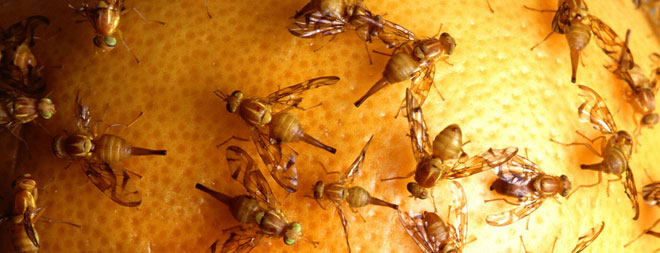In Space, Could Rotation Make The Immune System Stronger?

courtesy of USDAgov via flickr | http://bit.ly/1hYNUyB
(Inside Science) -- Could adding a fast-rotating carnival-style ride to space stations save astronauts from the damaging effects of microgravity? Fungus-covered flies, fresh from a twelve-day trip to space, might have the answer.
"All the way back to the Apollo and Skylab missions, astronauts were getting ill during and after flights - and those are extremely healthy people," said Deborah Kimbrell, a geneticist at the University of California, Davis who led a study that was published in the online journal PLOS One on January 24.
(As a disclosure, I should mention that a friend of mine, Patrick Fuller, was also one of the authors of the paper.)
To test the effects of gravity on the immune system, the researchers hatched flies on a space shuttle in 2006 and then, after they returned to Earth, split them into three groups. One of the groups was infected with fungus, another was infected with E.coli, and the last was left alone. The same steps were taken with flies born and raised at Florida's Kennedy Space Center, under gravity, but otherwise the conditions were as close as possible to the ones on the shuttle.
The space flies had significantly reduced immunity to the fungus, compared to their Earth-born brethren (all the flies studied were male). However, their response to E. coli remained unchanged, which indicated a possible mechanism for the immune effects. The Toll pathway, which is a series of genetic signals important in both fly development and immune systems, took a major hit in the flies born on the shuttle. Immune Deficiency signaling, which helps flies fight off E. coli, was unaffected by the microgravity.
During takeoff and landing, astronauts -- and space flies -- also experience hypergravity. A similar experience can be achieved through centrifugal force, similar to what you feel on a spinning carnival ride.
To test the effects of hypergravity on immune systems, UC Davis researchers infected flies with fungus and stuck some of them in a centrifuge. Surprisingly, the spun flies had much better survival rates than their staid siblings. This points to a possible way to help astronauts keep their health on longer missions: install human-sized centrifuges in space stations and spaceships.
"If you try to fix piecemeal what goes on in space, it's so daunting," Kimbrell said. "Bone and muscle loss, the immune response, all the things that struggle when you're in space -- if you could just spend some time in normal gravity, that might mitigate the effects."
Model organisms, like flies and mice, are incredibly important as scientists search for ways to keep astronauts healthy -- especially for longer missions.
"Astronauts are going up for weeks, others are going up for several months. Some are younger, some older, some male, some female," said Sharmila Bhattacharya, the head of the Biomodel Performance and Behavior Laboratory at NASA Ames Research Center in Mountain View, Calif., who was not involved with the study. "Anecdotally, if something happens in one or two, it's very difficult to draw conclusions from such a small sample size. A smaller, simpler biological model is easier to work with when you're talking about statistics."
Cat Ferguson is a science and technology journalist based in California's Bay Area.
